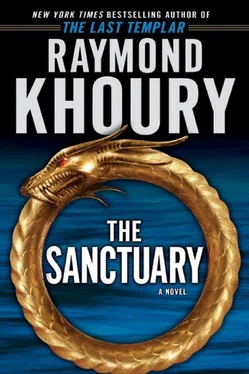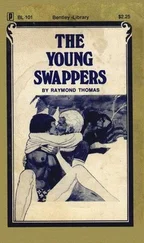“Of course,” Evelyn interjected. She’d kept in touch with the curator of the National Museum of Antiquities in Baghdad. Especially post-invasion, when the whole looting scandal had erupted. “Farouk, you know I can’t touch these. We shouldn’t be having this conversation.”
“You have to help me, Sitt Evelyn. Please. I can’t go back to Iraq. It’s worse than you imagine. You want this book, don’t you? I’ll get it for you. Just help me stay here, please. You can use a driver, can’t you? An assistant? I’ll do anything. I can be useful, you know that. Please. I can’t go back there.”
She winced. “Farouk, it’s not that easy.” She shook her head faintly and glanced at the desolate hills sweeping away from the mosque. Along a small stone wall, row upon row of brown tobacco leaves, threaded onto wires months ago to dry in the summer sun, lay there, rotten and grayed, covered in the same thick dust that smothered the entire region. Overhead, the faint buzz of an Israeli drone rose and died with the breeze, a constant reminder of the simmering tension.
Farouk’s face darkened. His breathing was now shorter and faster, his hands agitated. “You remember Hajj Ali Salloum?”
Another name from the past. An antiques dealer too, if Evelyn’s memory was correct — which it usually was. Based in Baghdad. His shop was three doors down from Farouk’s. She remembered them being close, though staunchly competitive when it came to clients and sales.
“He’s dead.” Farouk’s voice was quivering. “And I think it’s because of this book.”
Evelyn’s expression clouded as she struggled for words. “What happened to him?”
A sharper fear flickered in his eyes. “What is this book about, Sitt Evelyn? Who else is after it?”
Consternation flooded her voice. “I don’t know.”
“What about Mr. Tom? He was working on it with you. Maybe he knows. You need to ask him, Sitt Evelyn. Something very bad is happening. You can’t send me back there.”
The mention pricked Evelyn’s heart. Before she could answer him, Ramez’s voice echoed through the mounds of rubble around them.
“Evelyn?”
Farouk shot her an anxious glare. She craned her neck to see Ramez appear, making his way over from the mosque. She glanced back at Farouk, who was looking down through the alleyways, towards the main street. When he turned back to face her, the blood seemed to have drained from his face. He shot her a look of such terror that she felt her heart constrict. He pushed the small stack of photos and the envelope into her hands and just said, “Nine o’clock, downtown, by the clock tower. Please come.”
Ramez reached them, clearly wondering what was going on.
Evelyn fumbled for words, unsure about what to say. “Farouk’s an old colleague of mine. From the old days, in Iraq.” Ramez seemed clearly aware of the unease hovering over them. Evelyn sensed Farouk was making a move and reached out to him reassuringly. “It’s okay. Ramez and I work together. At the university.”
She was doing her best to telegraph to him that her colleague wasn’t a threat, but something had visibly spooked Farouk, who just nodded furtively at Ramez before telling her with an insistent, pleading voice, “Please be there.” And before she could object, he was already scrambling up the path, away from the town center, heading towards the mosque.
“Wait, Farouk!” Evelyn sidestepped away from Ramez and called out after him, but to no avail. He was already gone.
She turned back to Ramez, who seemed mystified. She suddenly remembered that the Polaroids were still in her hand, in plain sight for him, and he’d noticed them. He looked a question at her. She stuffed them in the envelope and pocketed it quickly while conjuring up a disarming smile.
“Sorry about that. He’s just…It’s a long story. Shall we get back to the chamber?”
Ramez nodded politely and led her back up the path.
She followed him, her eyes distant, the pit of her stomach garroted by Farouk’s unsettling words, her mind too overwhelmed to register a fleeting image from the town below: two men, standing by the edge of the road, a hard, stone-dead look in their eyes — not uncommon given the setting or the context, an expression she’d gotten used to seeing since the war — and yet, somehow disconnected to the activity around them, looking up in her direction, before one of them got into a car that drove off rather abruptly, the other catching her eye momentarily before moving off and disappearing behind a collapsed house.
“Do you have him yet?”
He’d left Baghdad over four years ago, and yet, despite his natural talent for foreign languages and his best efforts, his Arabic vocabulary and accent were still influenced by his years in Iraq. Which is why the men who were assigned to work for him — led by Omar, the man who had just called — all came from the east of his new adopted homeland, close to its border with Iraq, where they’d been facilitating the smuggling of weapons and fighters in both directions. The two languages were broadly similar — think of California Valley — speak vs. East London cockney — but the variance between them was enough to spawn inaccuracies and generate misunderstandings.
Which wouldn’t do.
He prided himself on accuracy. He didn’t tolerate imprecision, nor did he have much patience for unreliability. And he could tell from the man’s discomfited tone, from the very moment he’d been interrupted and picked up the call, that his patience was about to be sorely tested.
There was a hesitant pause before the cold answer came back over his cell phone. “No.”
“What do you mean, no?” the hakeem rasped as he angrily flicked off his surgical gloves. “Why not? Where is he?”
Omar wasn’t easily cowed, but his tone was now tinged with some added deference. “He was being careful, mu’allimna .”
On either side of the border, the men assigned to him always called him that. Our teacher. A lowly servant’s self-effacing moniker of respect. Not that he’d taught them much. Only to make sure they did what they were asked and did it without asking any questions. It wasn’t so much teaching as it was training, with fear as the prime motivator.
“We didn’t really have the right opportunity,” Omar continued. “We followed him to the American University. He visited the Archaeology Department. We waited for him outside the building, but he must have used another exit. One of my men was watching the sea gate and saw him sneaking out and getting into a taxi.”
The hakeem frowned. “So he knows he’s being followed,” he said gruffly.
“Yes,” Omar confirmed reluctantly, before adding, “But it’s not a problem. We’ll have him for you by tomorrow night.”
“I hope so,” the hakeem countered acidly. “For your sake.” He was trying hard to keep his rage in check. Omar hadn’t failed him yet. The man knew what the stakes were, and he was ruthlessly good at his job. He’d been seconded to the hakeem with clear orders to look after him and make sure he got everything he needed. And Omar knew failure wasn’t tolerated in the service. The hakeem took some solace from that. “Where is he now?”
“We followed him to Zabqine, a small town in the south, close to the border. He went there to meet someone.”
This instantly piqued the hakeem’s interest. “Who?”
“A woman. An American. Her name’s Evelyn Bishop. She’s a professor of archaeology at the university. An older woman. She must be in her sixties. He showed her some documents. We couldn’t get close enough to see what they were, but they must have been pictures of the collection.”
Читать дальше












